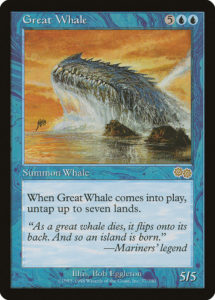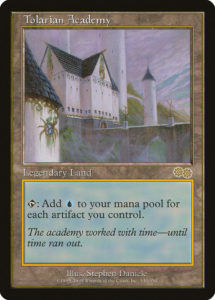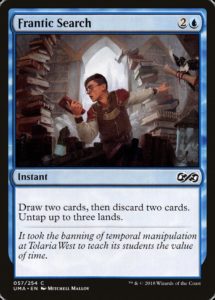One of my favorite Limited formats of all time is Ultimate Masters. It offered a wild confluence of strategies that all felt like cheating. As with Modern Masters 2013 (another of my favorite formats), there was a ton of powerful and disparate tools available; but UMA was far less about staying in a single lane like UR Splice or WB Rebels and far more about finding crossover synergies, like Madness/Spells, self-mill and Delve, or setting up Heroic loops with Conviction. And no card was more fun or central to this format for me than Frantic Search.
I’ve been steadily designing a cube based on UMA and around Frantic Search, so let’s take a moment and appreciate this absolutely bonkers blast from the past.
A well-intentioned, utterly broken mechanic
Back in 1998, Magic was a major success, but it was still quite young. The color pie was much of the way through shaking out (though Dark Ritual still had years before migrating into red), but Limited had only been supported for a few years. Perhaps most interestingly, mechanics were seen as disposable in this era, rather than worth preserving for future use (Cycling would be the first non-evergreen mechanic to return in 2002’s Onslaught).
Even mechanics as simple as cantripping (a spell drawing you a card in addition to another effect) were thought to be a thing of the past, since cantripping was used in Ice Age, Alliances, and Weatherlight. Tempest experimented with an alternate take on cantripping in Buyback, where instead of getting a random card, you got your card back (at additional cost). Buyback would prove both powerful and problematic, since it decreased variance in gameplay patterns. So, Urza’s Saga introduced a third and fourth take on self-replacing spells: the free mechanic and Cycling (which turns cards into cantrips).
The free mechanic isn’t keyworded, but it works the same way on every card. Great Whale costs a whopping seven mana, but when you get your creature, it untaps seven lands for you. Snap is a two drop, so it untaps two lands. Rewind costs four, so it untaps four lands. In general, spells with the free mechanic cost a bit more than they normally would (~1.5 mana), but in return for this initial overpayment, you get all that mana back. Setting aside any shenanigans, this mechanic is incredibly powerful since it undermines the man system—normally, players are restricted by how much mana their lands produce in a single turn, but the free mechanic lets you reuse your lands multiple times. The thing is, there are so, so many shenanigans to play with.
Shenanigans Ensue
Normally, lands only produce one mana. But Urza’s Saga introduced some of the most powerful lands Magic would ever see, with Tolarian Academy not only being the most powerful, but also producing the blue mana that all free spells needed. The first (and aptly named) flicker effect would soon be printed in 1999’s Flicker, allowing you to turn a Peregrine Drake into a super Dark Ritual. Cloud of Faeries provided easy support for Spellstutter Sprite in Pauper until it was banned.
The free mechanic varies in potency, being weaker on reactive effects like Rewind and stronger on proactive and instant-speed cards like Frantic Search, but overall it’s one of the most broken mechanics in all of Magic. It becoms stronger as mana costs rise, making it incredibly difficult to balance and limiting it to super specific cards like Unwind or expensive cards with miniature versions of the effect like Pore Over the Pages (which is nevertheless a potent part of Pioneer Breach combo decks).
So, so many options
Frantic Search has probably the most varied options of all the free spells. Once upon a time, I only knew it as a cube Reanimator enabler. Its card disadvantage is a problem for most cube decks, but Ultimate Masters opened my eyes to all the fun uses it has. You can mitigate the card disadvantage by discarding flashback spells or using it alongside Young Pyromancer. You can combine it with Delve spells to make it function as a Black Lotus. You can do the intended use of digging for a high impact spell while pitching excess lands. Or you can do the most fun and naughty thing: enabling Madness.
I wasn’t playing during Odyssey or Time Spiral blocks, so I missed out on the utter absurdity of how it used to work (where apparently the rules once let you play a land in between discarding and casting a card with Madness). But there’s something devilishly clever-feeling about turning self-discard, a very bad thing, into a cost-reducing, card advantage-producing good thing. Nothing is more emblematic of Ultimate Masters in my mind than using Frantic Search to discard a Basking Rootwalla and a Fiery Temper. That moment is what spurred me to make an entire cube as a love letter to the set.
Frantic Search is certainly not a fair or balanced Magic card. It’s far, far too strong for Constructed and bears a mechanic that probably should never have been printed. But one of Magic’s many joys is using cards to circumvent the rules of the game—that’s been in the game since Alpha—and Frantic Search accomplishes that not only very successfully, but in an incredibly wide array of ways. It’s a card that I love to resolve and will be breaking the singleton cube rule for the first time for. I’m looking forward to finishing this yearlong passion product in the next few weeks and then seeing whether I’m courting disaster by embracing Frantic Search and similar broken themes, or if I’ll get to share my adoration of this card in a fun and healthy way. Here’s looking forward to finding out!
And, as always, thanks for reading.
—Zachary Barash is a New York City-based game designer and the commissioner of Team Draft League. He designs for Kingdom Death: Monster, has a Game Design MFA from the NYU Game Center, and does freelance game design. When the stars align, he streams Magic (but the stars align way less often than he’d like).




